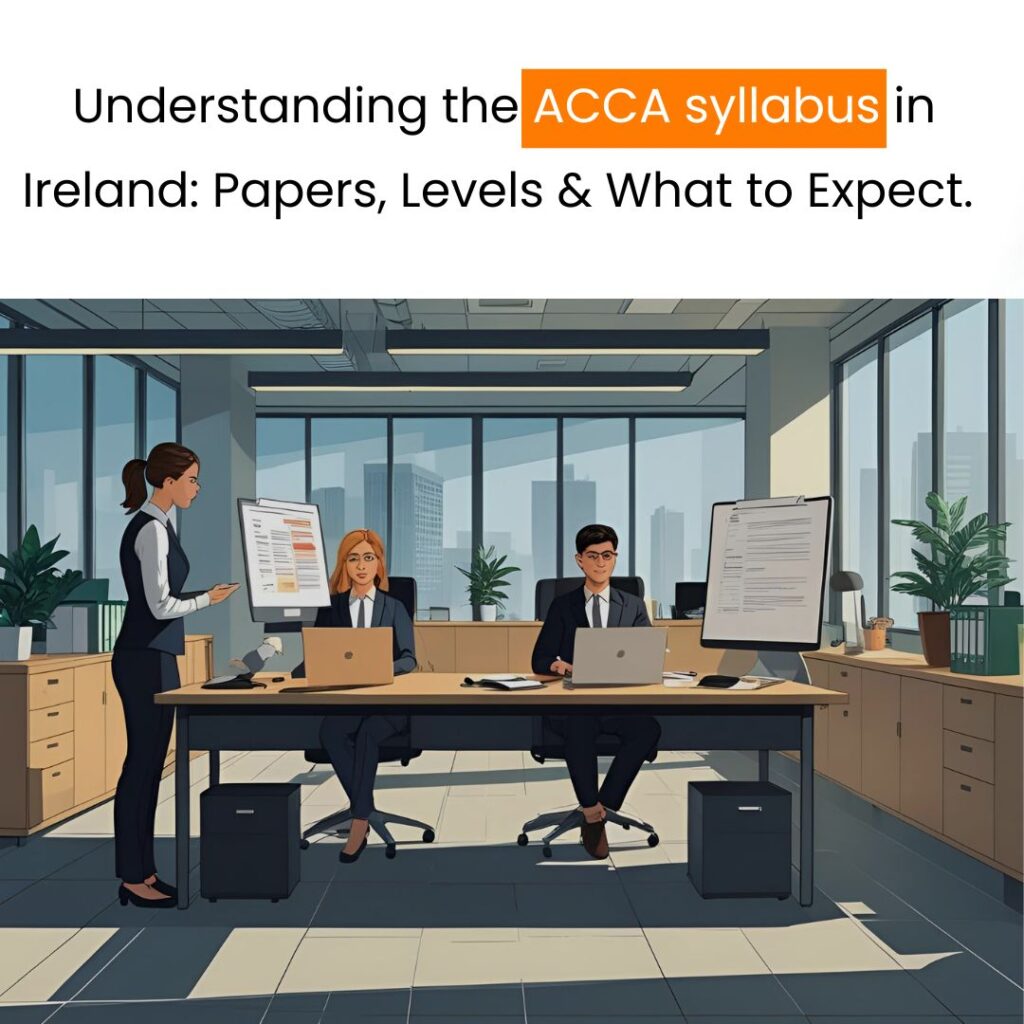INTRODUCTION:
Learning all key details about the ACCA syllabus in Ireland is vital to lead your journey towards success and academic growth. The ACCA syllabus is categorised into three academic levels to cover the diverse accounting and finance modules efficiently. Among these three levels, 13 modules are divided; each module focuses on a different accounting/finance topic. The modules comprehensively cover the area of study, focusing on building technical, soft, and practical skills. The qualification of ACCA is very much focused on equipping aspirants with all the skills to survive in the practical world; this is exactly what makes this accounting qualification one of the most advanced and progressive qualifications of the modern world.
Achieving success in this qualification can open the door to enhanced career prospects and a progressive financial career. Want to be one of the future leading finance professionals? Use the ACCA academic path; take your first step today by understanding the ACCA syllabus in Ireland. This blog will be helpful for you in helping you understand the unique ACCA syllabus and academic requirements.
OVERVIEW OF THE ACCA QUALIFICATION:
ACCA a leading accounting qualification acknowledged globally, is currently recognized in more than 180 countries around the world. The hype is forecasted to grow as it opens the door to numerous career opportunities, diverse career prospects, and professional growth. The qualification is comprehensive yet very flexible in terms of study modes, patterns, and resources, making it a likely academic path for finance aspirants.
ABOUT ACCA SYLLABUS:
The ACCA syllabus in Ireland is designed with topics regarding finance, accounting, and management, making you efficient to work in several roles and sectors. The key features of the ACCA syllabus in Ireland are that the syllabus emphasizes practical learning rather than focusing on theoretical aspects only, and it places much pressure on the understanding and effective usage of global accounting standards.
ACCA SYLLABUS STRUCTURE:
The ACCA syllabus in Ireland comprises 13 modules and is divided into three academic levels (Applied Knowledge, Applied Skills, and Strategic Professional) as follows:
LEVEL 01: APPLIED KNOWLEDGE:
The fundamental level focuses on developing core accounting concepts and basic principles of accounting, finance, and business; it covers three modules:
- Financial Accounting
- Management Accounting
- Business & Technology
LEVEL 02: APPLIED SKILLS:
The intermediary level, a bit complex and comprehensive than the previous one, covers a variety of ACCA modules; the total number of ACCA modules in this level is six, namely:
- Financial Management
- Audit & Assurance
- Performance Management
- Business and Corporate Law
- Taxation
- Financial Reporting
LEVEL 03: STRATEGIC PROFESSIONAL:
The most advanced level focuses on specialized modules and developing analytical skills (especially leadership and strategic thinking); this level is subdivided into two parts (essentials and selectives). The total number of modules in this level is four; two from the essential part and two from the selectives part.
ESSENTIALS:
- Strategic Business Leadership
- Strategic Business Reporting
SELECTIVES: (Choose any two)
- Advanced Audit & Assurance
- Advanced Performance Management
- Advanced Financial Management
- Advanced Taxation
OTHER ACADEMIC MODULES AND QUALIFICATION REQUIREMENTS:
Alongside completing the modules included in the ACCA syllabus, aspirants are obliged to meet other qualification requirements as well to become a Certified Chartered Accountant; these requirements include completing the EPSM modules and gaining the PER experience. Never heard it before? No worries, here is a brief about what each of them is and why they are essential.
EPSM MODULES:
EPSM stands for Ethics and Professional Modules, designed by the ACCA to equip aspirants with ethical and professional skills to manage their survival in the complex and highly professional financial world. These are the mandatory modules that aspirants can take before or after completing the Strategic Professional level.
ACCA AND PER:
PER stands for Practical Experience Requirement; for a qualification like ACCA, which is mainly focused on career aspects requiring practical experience as a part of the qualification, it can not be much of a shock. It is an essential requirement that needs to be completed to become a qualified ACCA member. In this, aspirants have to gain at least 36 months of relevant work experience in auditing, finance, or the accounting sector with an ACCA-approved employer. This experience should be properly recorded and signed by an ACCA member and then submitted to the ACCA Global for approval. Aspirants are advised to begin gaining this experience alongside their studies to save time and extra efforts.
WHAT TO EXPECT FROM EACH ACCA ACADEMIC LEVEL:
- Applied Knowledge is easier, manageable, and includes basic accounting & principles.
- The Applied Skills level is complex and diverse, especially modules like Financial Reporting and Performance Management.
- Lastly, the Strategic Professional level tests your analytical skills, strategic thinking, and real-world application; it is considered the most challenging level of the ACCA qualification.
CONCLUSION:
The ACCA syllabus in Ireland might feel too much to handle right now, but the long-term benefits this curriculum brings to the table are commendable; the comprehensive, diverse, and challenging exams today prepare you for a bright career tomorrow. The best thing about the ACCA syllabus is that, rather than focusing on the usual cramming of theoretical concepts, it encourages aspirants to learn its application through practical scenarios. This way, by the end of the qualification, the aspirant is ready to dive into the challenging financial world. Therefore, if you are an ACCA aspirant, stay determined, with focus and consistency, and you can be the next leading finance professional of Ireland.
FREQUENTLY ASKED QUESTIONS:
Q1: Which documents are needed during the ACCA registration process?
Answer: Mainly, the documents needed during the registration process include academic transcripts, previous degrees/ certifications (if any), and proof of identity.
Q2: What is the minimum passing grade for ACCA exams?
Answer: To clear ACCA exams, you need to score a minimum of 50% in each ACCA module; strategic professional exams are marked holistically as they are entirely based on case studies and scenario-based questions.





